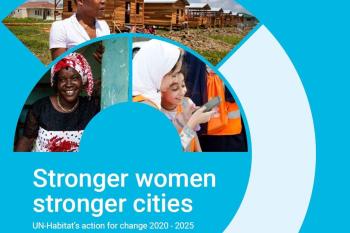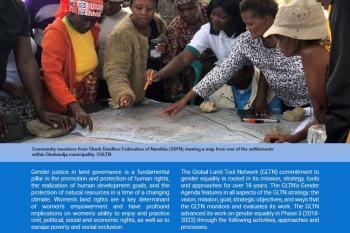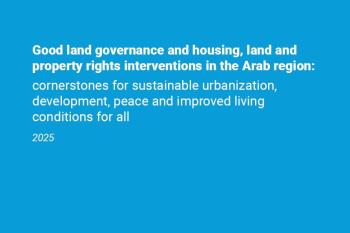
Read More
Stronger women stronger cities: UN-Habitat’s action for change 2020 – 2025
This publication presents a summary of UN-Habitat’s gender equality impact over the past five years, in line with the Beijing reporting cycle.

This paper contributes to the emerging literature on the gendered impacts of the contemporary wave of foreign agricultural investments (Behrman, Meinzen-Dick & Quisumbing, 2012; Daley, 2011; Daley & Park, 2012; Food and Agriculture Organization of the United Nations
, 2013a–d, 2015; Doss, Summerfield, & Tsikata, 2014). The outcomes of agricultural investments for men and women often differ in rural areas of the Global South where gender inequalities are persistent. Barriers to women’s access to productive resources— production inputs, credit and training—reduce female agricultural producers’ yields by 20–30 per cent from their full potential (FAO, 2011).
Further, culturally based gender discrimination often leaves women with a heavier burden for care work, diminishes their access to education, restricts their access to land and limits options for decent paid work (United Nations Conference on Trade and Development
, 2015). The evidence presented in this paper indicates that these inequalities are often exacerbated by foreign agricultural investments, unless investors and host country governments work to ensure that investment contracts address the needs of women farmers and agricultural workers.
The purposes of this paper are three-fold. First, it seeks to analyze the gender-related content of the Voluntary Sustainability Standards (VSSs) and the responsible investment frameworks. Second, it attempts to answer the question “Do VSSs improve gender equality?” And third, it aims to explore how the responsible investment frameworks can build on the successes and failures of the VSSs to improve gender equality in agricultural investment projects.
It uses the experiences of VSSs to provide guidance for responsible investment frameworks because the latter are quite new, and only scant anecdotal evidence about their impacts is available. The research is based on a desk review of the certification criteria and principles of five major VSS initiatives and five responsible investment frameworks, a literature review of the impacts of VSS initiatives on gender inequalities, and a close reading of policy reports and scholarly literature on the main obstacles to gender equality in agriculture, particularly in contexts of foreign direct investment.

This publication presents a summary of UN-Habitat’s gender equality impact over the past five years, in line with the Beijing reporting cycle.

GLTN’s institutional commitment to gender equality and secure land rights for women and girls has been at the core of its work since inception in 2006.

The booklet ‘Good land governance and housing, land and property rights interventions in the Arab region’ collects the key recent land, housing and property rights-related projects and initiatives